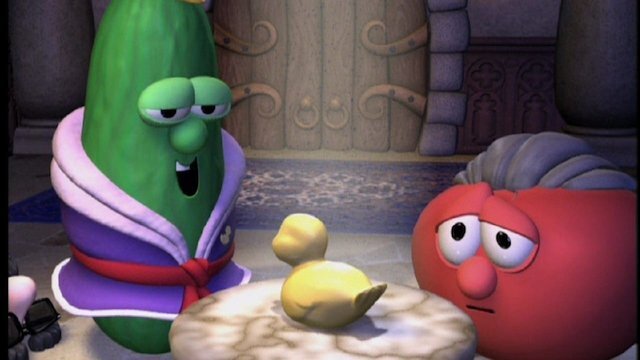The Bible, the single most important book in history, is full of beautiful, amazing and life-changing stories, in addition to stories of violence and sex (looking at you Song of Solomon) and the occasional talking animal. As a result, the challenge of youth pastors and parents is how to teach lessons from these less-than-kid-friendly stories. One group of vegetable-loving people attempted to solve this problem.
Photo and title photo from Wikipedia
“VeggieTales” is a staple in most Christian homes, and its songs are trapped in the minds of those who heard the silly tunes. However, despite its upbeat storylines and silly tunes, “VeggieTales” still had to make sure important lessons were not lost when they turned Bible stories kid-friendly. One such story they attempted to do this with was David and Bathsheba.
Of course, we all know this story. Much like other David stories, he does something stupendously stupid, but repents harder than a Covenant Chemistry test. Usually, pastors will double check that kids are not present before and during a sermon on this story because David and Bathsheba commit adultery. David then decides to kill Uzziah, Bathsheba’s husband. This story teaches the importance of repentance and the hard reality of facing the consequences for the sins you commit. So clearly, these armless veggies had their work cut out for them.
In the “VeggieTales” version, David's wives and Bathsheba are rubber duckies (admittedly a little creepy), and the whole story is about Larry wanting more rubber duckies even though he already has a huge collection. He then sees Thomas, played by Junior the Asparagus, taking a bath with his jaw-dropping rubber ducky. In an act of extreme covetousness, Larry sends Thomas to the front lines of the great pie war and steals his ducky. Some time later, Thomas returns as a war hero, but suffers memory loss. After a prophet visit, a wise parable, and the return of the duckie, Larry asks for forgiveness. This entire story is only around 20 minutes long and everything is explained expertly, along with a full serving of comedy and song. The main lessons are to repent, ask for forgiveness and treat others how you want to be treated.
Photo from IMBD
The story obviously differs in some ways. For example, Thomas does not die, there is obviously no child conceived out of an adulterous affair and names of the talking vegetables are different from the actual story. The one lesson they fail to explain or showcase is that sin brings judgment. However, in a Venn diagram of people who can theologically understand this and the “VeggieTales” target audience, the overlap is infinitesimally small.
David and Bathsheba's story is important in the Old Testament but is usually skipped over in Sunday school. Many people agree kids probably should not read some Bible stories until they are older (looking at you again, Song of Solomon).
“VeggieTales” does not follow the story extremely closely and does lose important themes and plot points. However, it should be celebrated for the child-safe lock it puts on the story. Just like children slowly learn how to eat real food, they need to be introduced to the stories and theology of the Bible slowly and in a way that ensures a healthy upbringing. “VeggieTales” does this exceptionally well.
In conclusion, “VeggieTales” successfully retails the story of David and Bathsheba for a younger audience, and if you ask me, gives some quality entertainment (the silly song “Barbara Manatee” is an absolute banger). Bible stories can be extremely hard to adapt and even harder to entertain people with, but these lovable vegetables found the answer.


